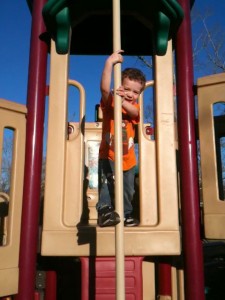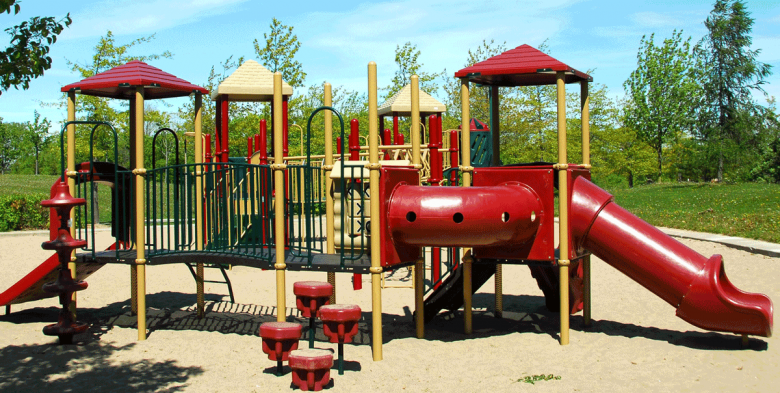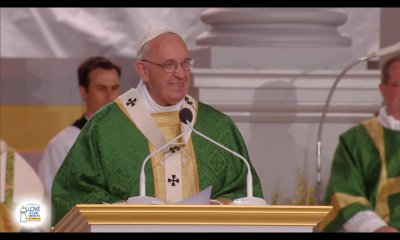They’re Children, Not Chickens
Two Moms go to a playground with their kids, ages 2 – 4. One child asks his mom to help him use the fire pole, so she holds him the whole way down. The second child asks the second mom for help. She says, “I’d be happy to teach you how to do it, but I’m not going to do it for you. Do you want to learn?” Second-Child hesitates before agreeing. Second-Mom explains how to reach out, hold the pole nice and high, then step out while holding on, wrap feet and legs around the pole, and gently loosen the hold to slide down. She guides her son’s grip, holds her hands out to catch him in case he needs it, but tries not to actually do the work for him. By the third try, he’s doing it with enough confidence that she can sit back and watch.

“I DID IT!”
Have you seen the posts about “Free Range Kids” popping up around the internet lately? Most recently, the Washington Post highlighted an incident involving Maryland parents letting their kids go out and play without supervision, someone saw the unsupervised kids, called the police, and CPS got involved. Much of the commentary that I’ve read centers around anecdotal evidence: my own childhood involved unsupervised play… and this is what I do with my kids and it works… And then there are the parents who ask “What’s wrong with a little parental supervision?” The nature of the discussions can lead you to believe it’s all about choosing-your-own parenting philosophy.
The thing is that as a Catholic, as a Christian, as an educator, and as a parent, I feel like we’re missing the opportunity to talk about something deeper here. There’s a principle of social justice that applies to this discussion. A principle that extends from the Seven Major Themes of Catholic Social Teaching: subsidiarity.
When we talk about subsidiarity, we tend to focus on government–on the smaller, local level and the larger, national level.
Essentially, subsidiarity is about responsibly allowing people to do for themselves what they can, intentionally limiting intervention yet assisting when needed, and doing so with the common good in mind. It’s about empowering people, and it respects human dignity.
Subsidiarity is the balance that reasonable people are calling for when faced with the negative extremes of too little involvement (neglect) and too much involvement (hovering, helicopter parenting, or micro-managing). Our notion supervision needs to be infused with principle of subsidiarity.
With subsidiarity, we teach our children to participate in the world around them. We guide them on how to make decisions. We use our judgment as we incrementally increase their sense of freedom and responsibility. And in doing so, we guide them into responsible adulthood.
So “free-range kids”? I regret the necessity of the phrase “free-range kids.” They’re children, not chickens. But I understand the point author and blogger Lenore Skenazy is trying to make. She offers the label as a commonsense approach to parenting that rejects the negative extremes of neglect and helicopter parenting. In her book and through her blog, Skenazy’s intent is to help parents raise safe, self-reliant children–an intent which is keeping with the principle of subsidiarity.
I really appreciated Catholic blogger Simcha Fisher’s post about “Raising Safe, Independent Kids” on the National Catholic Register. She highlighted sympathy for parents who have been criticized for encouraging unsupervised play, while also offering a clarification on the realities of CPS, and concluded by offering solid, reasonable advice for parents.
Subsidiarity is not about compromising safety. But it is about releasing fear. We shouldn’t make decisions–about parenting or otherwise–based on fear.
Fear leads us to hovering, micro-managing, and helicopter parenting–practices that give us the illusion of control. Fear prevents us from living and loving freely, and it robs our children of their sense of freedom and responsibility.
What is it that Scripture says about fear? Oh yeah.
Be not afraid, I am with you. (Isaiah 41:10)
“Playground © Depositphotos.com/elenathewise”






